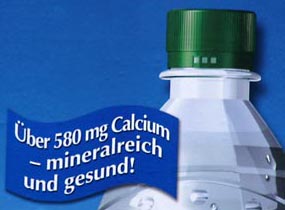Your Doctor Says: Usable Applications Are Good for Your Health!
By Gerd Waloszek
To overview of UI Design Thoughts
Each morning, when I ride my bicycle to work, I pass by a huge road sign advertising a mineral water brand. The poster promotes the water's mineral nutrients and trace elements as being beneficial to health. It is just one more piece of evidence that today's consumers no longer drink something because they are thirsty – they drink it because it boosts their health. This is not only true for drinking but for nutrition in general: We no longer eat food because it tastes good, we eat it because it is good for our health – or rather because some authorities tell us it is good for it.

Figure: "Healthy energy ... with the best from nature" (details see figure below)
Sometimes, I wish we were back in the Middle Ages with their revelries and drinking orgies, when they feasted on sucking pigs and game and drank gallons of wine and beer. Nobody thought of vitamins or nutritional ingredients, and no one had heard of cholesterol. I know that these revelries were reserved for the upper class. Many poor families had barely enough to eat. And of course, people died much earlier than nowadays – mal nutrition was one of the reasons. Today, we want to live to a ripe old age and remain in good health; we want – as the pop song goes – to be "forever young" (or even longer...) This forces us to watch what we eat and drink and to make some "ugly" compromises: for example, to drink fat-free milk (which is a contradiction in itself), egg-less scrambled eggs, or meat-free (soy) meat...
Amazingly, some areas of our lives are still excluded from this quest for health, including computer software. With each new Apple Macintosh computer that I buy, I get instructions on how to sit correctly at the computer, but there is never a hint of any possible effect of its software on my health. Yet, we all know that it does have an effect, particularly on our mental health. And we all remember vividly the – regrettably faked – video in which a user demolishes his computer. This can only have happened because the software had tortured him too much (at least was that our first idea)...
Nobody would deny that software influences our psyche, and most people would agree that is can also have an impact on our physical health. But the UI community hasn't made any noticeable efforts to make this connection more obvious to the public. First and foremost, most of us would think of situations in which users have to act under extreme time or psychological pressure, for example, when entering mass data or having to make serious decisions. But "normal" everyday work at the computer can also lead to stress and other forms of psychological strain and may eventually cause physical damage.

Figure: "More than 580 mg calcium – high in minerals and healthy!"
How can users opt for software that causes less psychological strain and doesn't harm their health? Today, there are no such options. So I will make a suggestion: What about measuring not only task-related data, such as completion time and rate, but also physiological data, such as the levels of adrenaline and other stress hormones, and, for long term use, even cholesterol levels, which can also be a stress indicator? As a result, users would find a "health note" on the boxes that their software comes in, similar to the warnings on packets of cigarettes but of the opposite kind, telling:
Compared to competitive products, use of this software application leads to:
- 10% lower adrenaline levels
- 20% lower levels of other stress hormones
- 20mg/dl lower cholesterol levels (measured over half of a year of usage)
Let's hope that it will be the software that we have developed or consulted and not the competition's that gets good ratings!
Originally Published: 07/10/2006 - Last Revision: 01/31/2009 • Also published as SAP Design Guild editorial
Gerd Waloszek |
made by |
